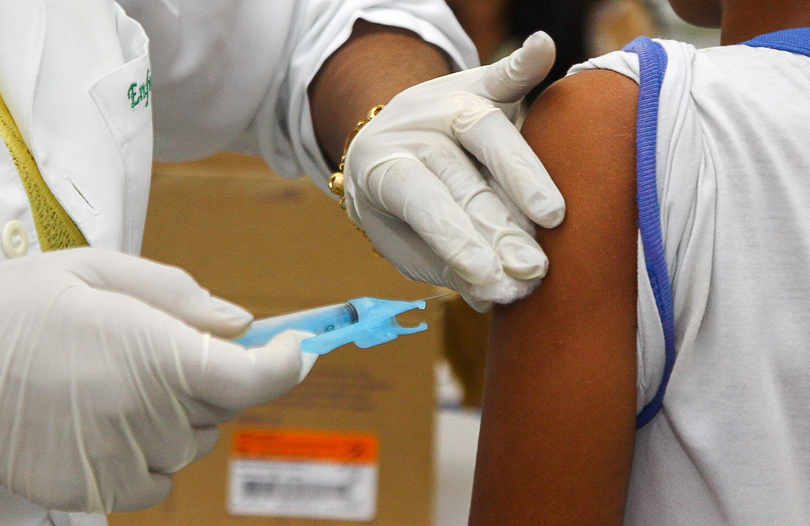The innovative strategy that evaluates child development during vaccination campaigns
Sonia Isoyama Venancio

Called early childhood, a child’s first five years of life are crucial pillars for determining the adult they will become in the future. But how do we evaluate each one around the world in order to correct any developmental delays? In Brazil alone, there are 13 million children under the age of four, according to the latest National Continuous Household Sample Survey (PNAD) 2019. Several efforts have attempted to create an instrument for assessing child development globally, and specialists have been deployed to develop measurement tools that offer an accurate picture of child development on a large scale in several countries, but this has not yet occurred in Brazil.
Based on her experience with large surveys on breastfeeding, doctor Sonia Isoyama Venancio, from the São Paulo Health Institute, proposed an innovative solution to this problem: use vaccination campaigns in Brazil as an opportunity to ask parents and caregivers about their children under the age of five. “It was necessary to create something fast that could be answered while waiting in line for a vaccine,” says Sonia.
Together with researchers and specialists in the field, she developed a questionnaire of 9 to 24 questions, depending on the child’s age, which covers cognitive, motor, language and socioemotional domains related to the child’s reactions and behaviors. Given the importance of analyzing factors that influence the child’s comprehensive development, the questionnaire also includes questions about health, nutrition, timely learning, safety, protection and responsive care, following the “Nurturing Care Framework” of the WHO, Unicef and World Bank. According to the researcher, this is the first instrument that makes it possible to monitor the care offered to children and its impact on child development in Brazil.
The PIPAS (Early Childhood for Healthy Adults) project, as it is called, involved several steps. The first step was to build the Development Assessment Questionnaire (QAD-PIPAS), analyzing its consistency and validity in comparison to other instruments, such as the Caregiver Reported Early Development Index (CREDI). Initially, the researcher launched a pilot study with 367 children in the cities chosen to evaluate the instrument during the vaccination campaign: Recife, Brasília and Embu das Artes. The goal was to determine if caregivers would be willing to participate and understood the questions in order to make the questionnaire more agile and well-rounded.
With the materials for the campaign developed and more than 274 interviewers trained to apply the instrument, data collection took place during the national vaccination campaign on September 16, 2017 at 44 health centers in the three cities. Caregivers of 2,331 children from zero to five years old were interviewed, while their children were playing with toys and books. The survey collected social, economic, health, nutrition, access to daycare, and participation in social programs data, as well as data on child development markers and activities to encourage children. A program website stored the information to make it available for future analysis at a later date and to inform city administrators’ planning. This step was essential for the validation of the instrument, which demonstrated very favorable results.
The researchers identified some crucial factors that contributed to possible delays in child development. These include: low maternal education, participation in a social program, health challenges and a caregiver that suspects the child has developmental problems, which can double the chances of having some kind of deficit. On the other hand, stimuli like reading children’s books have a positive influence. The problem is that 30% of those responsible said they had no books at home and half of the families had at most three books on their bookshelves. “Those that were not stimulated had lower scores on the questionnaire,” says Sonia.
The researchers also drew attention to the fact that 23% of children lived with users of alcohol or other drugs and 42% of caregivers had never received any information on child development. “It is necessary to train health workers and those responsible for day care centers to inform parents about this,” says Sonia. “This task is neither expensive nor requires sophisticated technologies, but it requires investments in training and communication.”
In order to improve public policies, the team presented the results to administrators from different areas of the participating cities, who discussed how to implement priority actions for child development. “To engage and raise awareness, we have to involve three sectors: health, education and social assistance.”
Given that it is considered a simple to use tool that is both easy to field and cheap, PIPAS has attracted the attention of other administrators and has already moved to the next level. Last year, it received investment from the Maria Cecília Souto Vidigal Foundation to develop an application, which made data collection even easier. A test of the application was carried out in 16 municipalities in Ceará and screened 7,000 children. In addition, in 2019, the Ministry of Health guaranteed resources to deploy the questionnaire in all capitals, which will occur in 2021 due to the Covid-19 pandemic. This will reach 27,000 children, further expanding the sample and diagnosis of the child development situation in Brazil. “We are also evaluating the possibility of it being incorporated into the next PNAD and used in 446 priority municipalities involved in a Ministry of Health project that seeks to strengthen the National Policy for Comprehensive Child Health Care.”

